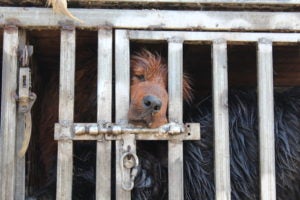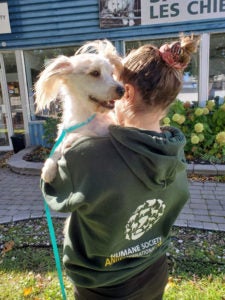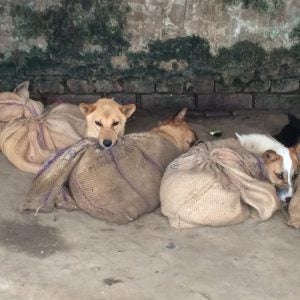
BEIJING—The city of Zhuhai in Guangdong province has become the second city in mainland China to ban the consumption of dog and cat meat, and of wildlife, in what campaigners at animal charity Humane Society International hope will be the start of a domino effect of progressive legislation across China to end these brutal trades that see an estimated 10 million dogs and 4 million cats killed every year, mostly stolen pets and strays.
Zhuhai’s ban comes after the city of Shenzhen banned dog and cat meat earlier this month, and just days after China’s Ministry of Agriculture and Rural Affairs publicly stated that dogs are companion animals and not “livestock.” The Standing Committee of the People’s Congress of Zhuhai Municipality stated that lawmakers must adhere to China’s livestock “white list” of animals for human consumption. Other cities in mainland China are believed to be considering bans.
Humane Society International has been at the forefront of campaigns to end the dog and cat meat trade across Asia for many years and has helped to rescue thousands of dogs and cats from China, South Korea, India and Indonesia. In South Korea the charity works cooperatively with dog meat farmers to help them transition to alternative humane livelihoods, and lobbies regional and national governments to advance legislation.
Dr. Peter Li, HSI’s China policy specialist, welcomed the Zhuhai ban, saying: “Zhuhai’s ban on dog and cat meat eating is thrilling news for all those in China and around the world who have campaigned for so long to end this brutal trade. Coming so soon after Shenzhen’s ban and the government’s historic statement classifying dogs as companions, we hope this will be the start of a domino effect of progressive legislation across China with other cities following suit. With so many millions of dogs and cats falling victim to the meat trade, it’s easy to lose sight of the fact that most people in China don’t eat dogs and cats, and that for years there has been enormous public support there for an end to the cruelty. So now it would seem that in the absence of a national ban, cities are taking matters into their own hands and reflecting the mood of the people.”
“This isn’t just good news for animal protection, it’s very good news for public health because the dog meat trade poses a significant human health risk, linked to the spread of trichinellosis, cholera and rabies. Rabies has been found in dogs traded for human consumption in China, Vietnam and Indonesia, and is easily spread as thousands of dogs are crammed on slaughter trucks and driven across provincial borders to markets and slaughterhouses.”
Facts about China’s dog meat trade
- Thirty million dogs a year are killed across Asia for meat. There are estimated to be more than 91.49 million dogs and cats kept as pets in China. An estimated 10 million dogs a year are killed for China’s dog meat trade.
- The World Health Organization warns that the dog trade spreads rabies and increases the risk of cholera.
- Most people in China don’t eat dogs, in fact dog meat is only eaten infrequently by less than 20% of the Chinese population. A 2017 survey revealed that even in Yulin, home of the notorious dog meat festival, most people (72%) don’t regularly eat dog meat despite efforts by dog meat traders to promote it. Nationwide across China, a 2016 survey conducted by Chinese polling company Horizon, and commissioned by Chinese group China Animal Welfare Association in collaboration with Humane Society International and Avaaz, found that most Chinese citizens (64%) want to see an end to the Yulin festival, more than half (51.7%) think the dog meat trade should be completely banned, and the majority (69.5%) have never eaten dog meat.
Download video and photos of China’s dog meat trade.
END
Media contact: Wendy Higgins, whiggins@hsi.org






